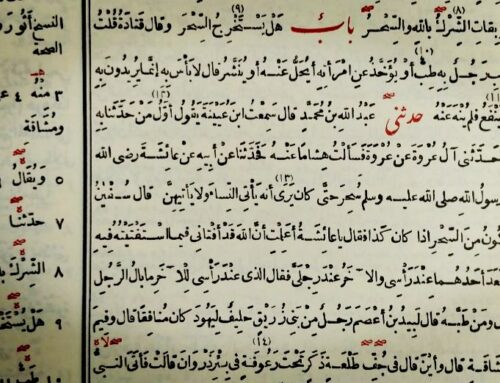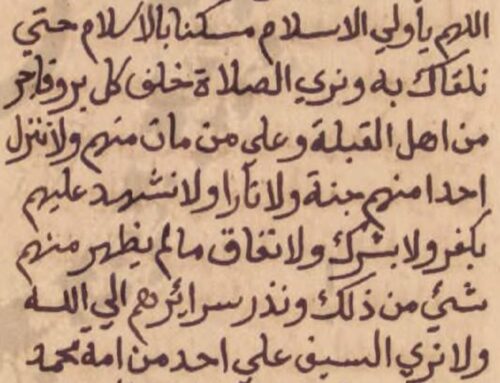By Guest Contributor
When people become hellbent on proving their viewpoint to be true, no matter how ridiculous it may be, it is common to see them gleefully embrace any information that confirms their view but dismiss or undermine anything that contests it. For people of this bizarre disposition, or “confirmation bias” to be more precise, the internet is an absolute goldmine, and “evidence” in support of the most preposterous arguments is just a few clicks away.
Nahiem Ajmal[1]aka Mufti Abu Layth al-Maliki, however, takes academic dishonesty to a different level altogether, where Googling to find a few dissenting opinions or ignoring an opposing view would not even be frowned upon. The former school-teacher relentlessly misquotes others and engages in what can only be labelled as woeful contextomy.
On the issue of the emergence of the Beast (dābba), one of the major signs of end times that is decisively proven from the Qur’an and authentic hadiths, Nahiem Ajmal purposefully misquotes the renowned Maliki exegete, Tahir ibn ‘Ashur (d. 1393). According to Nahiem Ajmal, Ibn ‘Ashur claims that the Beast will emerge on the Day of Judgment itself and not, as Muslims believe, before the Hour. He further claims on the authority of Ibn ‘Ashur that all the narrations on this topic are weak and unreliable.
Why Nahiem Ajmal is religiously devoted to distorting the consentient understanding of the Quran and Sunnah, who he seeks to appease with his academically-putrid methodology, and furthermore, why he feels nobody can detect his gross quoting-out-of-context are all discussions for another day. Here we will just show what Ibn ‘Ashur actually said and how Nahiem Ajmal, yet again, failed spectacularly in trying to put words into Ibn ‘Ashur’s mouth.
“…We will bring forth for them a creature from the earth speaking to them…”
After introducing Ibn ‘Ashur (rahimahullah) as: the Don of the Twentieth Century; the Legend; the Grand Mufti of the Malikiyya; the Shaykh al-Islam of the Twentieth Century; and “one of my indirect teachers who my chains of knowledge go through”, Nahiem Ajmal impresses upon his viewers that he is presenting Ibn ‘Ashur’s take on this issue, reinforcing this impression by passionately displaying the book and reading “directly” from it. But what Nahiem Ajmal forgets is that we have been taken down that route one time too many, and that we prudently live by the prophetic statement: “A believer is not bitten from the same hole twice”.[2]Bukhari, 6133, Muslim 2998
Nahiem Ajmal begins by talking about verses 80-81 of Surah al-Naml, which ironically mention how guidance does not benefit those who are blind and deaf to the truth. Thereafter, coming to the crux of the matter, Nahiem Ajmal presents his musings on the following verse which mentions the Beast:
“And when the word befalls them, We will bring forth for them a creature from the earth speaking to them, [saying] that the people were, of Our verses, not certain [in faith].” (Qur’an, 27:82)
Nahiem Ajmal’s “Interpretation”
Taking a cursory look at how Nahiem Ajmal explains 27:82 and comparing it to what Ibn ‘Ashur actually said really hits home how academic propriety is a concept foreign to Ajmal.
In explaining 27:82, Ajmal says:
“When the command has been established, when the matter has been resolved, when it has happened…this is what Allah is saying…that this matter has now been resolved. When is Allah talking about? When is everything resolved? It’s in the afterlife…We at that stage will bring forth for them a creature. This creature…this creature will strangely address them that they used to disbelieve in these signs, that Allah will give life to this inanimate creature to show them this is how we bring the dead to life.”
Nahiem Ajmal is claiming that the bringing forth of the Beast will occur in the afterlife when “the matter has been resolved”, as opposed to before the Hour, and with the purpose of showing people how Allah brings the dead to life.
The Purpose of the Beast According to Nahiem Ajmal
Before looking at what Ibn ‘Ashur actually said, an obvious question here that highlights the ludicrous nature of Ajmal’s claim is why Allah would need to present an inanimate creature, on the Day of Judgment of all days, to show people how He brings the dead to life! Each and every person ever to have stepped foot on earth will rise from his or her grave, so what further evidence is required to show how Allah revives? This will be a self-evident truth, which every denier of the Resurrection will have no choice but to accept on that day.
Allah says:
“And the Horn will be blown; and at once from the graves to their Lord they will hasten. They will say, ‘O woe to us! Who has raised us up from our sleeping place?’” (Qur’an, 36:51-52)
He says elsewhere:
“Their eyes humbled, they will emerge from the graves as if they were locusts spreading” (Qur’an, 54:7)
Ibn ‘Ashur’s Commentary
Moving on to Ibn ‘Ashur’s full text, it is not at all surprising to see that it reveals quite a different narrative to that presented by Nahiem Ajmal.
Firstly, Nahiem Ajmal translated the beginning of the verse: “when the word (qawl) befalls (waqa’a) them” as: “the matter has been resolved”, explaining this to mean once everything has been settled in the afterlife.
In his magnus opus commentary Al-Tahrir wa ’l-Tanwir, Ibn ‘Ashur says that qawl refers to the accounts of the Hour they used to deny.[3]Al-Tahrir wa’l-Tanwir, Vol 20, pg 38 As for waqa’a, which Nahiem Ajmal translates as “resolved” and “established”, Ibn ‘Ashur says it refers allegorically to the onset of the Hour, which is from the time the world begins to draw to an end until people enter their ultimate destination in either Paradise or Hell.[4]Al-Tahrir wa’l-Tanwir, Vol 20, pg 38
To cut it short, Ibn ‘Ashur is not entertaining, even for a moment, that this is referring to after “the matter has been resolved”, but in fact says the beginning of this time is when the world comes close to the end of its temporal existence. The emergence of the Beast, being one of the major and last signs before the Hour, sits perfectly with the time frame Ibn ‘Ashur has highlighted.
Nahiem Ajmal will, quite predictably, assert his right to interpret Ibn ‘Ashur the way he has claimed, but Ibn ‘Ashur himself leaves no room for Ajmal’s venturesome misinterpretation, and clearly sets the context:
والآية تشير إلى شيء من أشراط حلول الوعيد الذي أنذروا به وهو الوعيد الأكبر يعني وعيد البعث ، فتشير إلى شيء من أشراط الساعة وهو من خوارق العادات
“The verse is indicating towards one of the signs of the onset of the threat they were warned of, which is the greatest threat, i.e., the threat of resurrection. Thus, it is indicating towards one of the signs of the Hour that is part of the supernatural (khawāriq al-‘ādāt).”[5]Al-Tahrir wa’l-Tanwir, Vol 20, pg 38
Unless the word “sign” has an esoteric meaning which we are unaware of and which Nahiem Ajmal can kindly share with us, Ibn ‘Ashur has made it very clear that the emergence of the Beast is a supernatural sign that will transpire before the Hour. Hence, the only thing that makes sense in all of Nahiem Ajmal’s explanation is why he would choose not to cite the abovementioned text, which proves “unequivocally” that Ibn ‘Ashur does not interpret the Beast except as a sign before end times. Nahiem Ajmal has a knack for misquoting, but with Allah’s grace and ability, our knack to pinpoint his academic dishonesty is just as good, if not better. And all praise is for Allah.
Did Ibn ‘Ashur say the verse is speaking about the Beast emerging in the Afterlife?
Nahiem Ajmal says:
“Ibn ‘Ashur says that this is speaking about the Akhirah this beast. He says (Arabic text) this now moves on to a remembrance of the Day of Judgment and what has been held for them as a kind of intimidation. He says this is attached to the sentence before it.”
This is the text of Ibn ‘Ashur which Nahiem Ajmal quotes:
هذا انتقال إلى التذكير بالقيامة وما ادخر لهم من الوعيد
This is moving towards reminding of the Day of Judgment and the threat which has been reserved for them.[6]Al-Tahrir wa’l-Tanwir, Vol 20, pg 38
Naheim Ajmal, in his trademark prevarication, slips in the words “this beast” to imply that Ibn ‘Ashur is saying the Beast will emerge in the hereafter, whereas Ibn ‘Ashur has not even commented on the Beast at this point. Ibn ‘Ashur writes the text above immediately after citing 27:82, merely stating that the verses from this point onward are now focusing on the Day of Judgment and its events. The discussion on the Beast begins two paragraphs later, and in its own clear-cut context as one of the signs before the Hour. Again, it does not take a brain surgeon to work out how Nahiem Ajmal is misquoting Ibn ‘Ashur.
Another Gross Misinterpretation
After fast-forwarding past a few important paragraphs, Nahiem Ajmal continues:
“Now, then he goes on to say here. He says (Arabic text) He says this is because they used to deny the afterlife. And there is no doubt that the speech of this Beast to them…is an address…it is upon the occurrence of the Day of Judgment…the day Allah gathers everybody.”
The Arabic text Nahiem Ajmal selectively quoted, and translated even more selectively, is as follows:
وإخراج الدابة من الأرض ليريهم كيف يحيي الله الموتى إذ كانوا قد أنكروا البعث . ولا شك أن كلامها لهم خطاب لهم بحلول الحشر
The translation of Ibn ‘Ashur’s statement is as follows:
“Taking the creature out from the earth is to show them how Allah will revive the dead, as they had denied the resurrection. There is no doubt that its speaking to them is to address them regarding [not upon, as Ajmal states] the onset of the gathering (hashr).”[7]Al-Tahrir wa’l-Tanwir, Vol 20, pg 39
So, did Ibn ‘Ashur say the Beast will speak to them upon the occurrence of the Day of Judgment? How can Allah show the people how He will revive the dead if the Beast is brought after they have already been resurrected? There are numerous objections to Nahiem Ajmal’s illogical and untenable spin on this issue, but this much is enough for sincere readers. As for crooked minds, even the right things get crooked in them, as we have witnessed on so many occasions.
Moreover, it is important Ibn ‘Ashur is allowed to speak for himself and not put into a straitjacket and gagged by Nahiem Ajmal. Explaining why the Beast will speak, Ibn ‘Ashur says that it will be a means of belittling the people and making them regret their indifference to the profound truth of the Qur’an that had come to them through the best of Allah’s creation, the Messenger (sallallahu alayhi wasallam). This will be a form of humiliation for them at the end of time, i.e., close to the Hour, for which they will be taunted on the plain of resurrection: it will be said that these are the people who turned away from the words of the Noble Messenger (sallallahu alayhi wasallam), so they were addressed by a mute animal.[8]Al-Tahrir wa’l-Tanwir, Vol 20, pg 39
Ibn ‘Ashur further says:
وجملة إن الناس كانوا بآيتنا لا يوقنون تعليل لإظهار هذا الخارق للعادة حيث لم يوقن المشركون بآيات القرآن فجعل ذلك إلجاء لهم حين لا ينفعهم
The statement: ‘that the people were, of Our verses, not certain’ states the cause for this supernatural act, as the polytheists did not believe in the verses of the Qur’an, so this was done to coerce them [into belief] when it will not benefit them.[9]Al-Tahrir wa’l-Tanwir, Vol 20, pg 39
He further says:
والمعنى : أنها تسجل على الناس وهم المشركون عدم تصديقهم بآيات الله . وهو تسجيل توبيخ وتنديم ؛ لأنهم حينئذ قد وقع القول عليهم لا ينفع نفسا ايمانها لم تكن آمنت من قبل
The meaning is that it will record against the people, i.e., the polytheists, their nonacceptance of the verses of Allah. This recording will be to rebuke and make them regret, because at that time, the word: “no soul will benefit from its faith who had not brought faith before” will have befallen them.[10]Al-Tahrir wa’l-Tanwir, Vol 20, pg 39
Ibn ‘Ashur cites Qur’an 6:158 to substantiate that after the emergence of the Beast, nobody’s acceptance of Islam will be accepted. This is also stated in a hadith of Sahih Muslim (198).
As a final nail in the coffin for Nahiem Ajmal’s argument, it will be appropriate to relate what Ibn ‘Ashur stated in commentary of the verse: “The Day that some of the signs of your Lord will come no soul will benefit from its faith that had not believed before or had earned through its faith some good” (Qur’an 6:158).
Ibn ‘Ashur says that procrastination in the matter of accepting faith is extremely perilous, lest a time comes when it is too late to make amends and repent. This is either at the time of death, or when one of Allah’s supernatural signs of punishment descends, after which repentance is of no avail.[11]Al-Tahrir wa’l-Tanwir, Vol 8, pg 186
He then states:
Amongst the signs of Allah are the signs Allah has made for people in general, and they are the signs of the Hour, one of them being the sun rising from the West.[12]Al-Tahrir wa’l-Tanwir, Vol 20, pg 39
In very explicit terms, Ibn ‘Ashur is referring to the signs of the Hour and these supernatural signs of punishment (amongst them the emergence of the Beast), as the point after which faith and repentance will not be accepted of a person. This is before the Hour, not on the Day of Judgment. Thus far, Nahiem Ajmal has only been able to show any disparity between Ibn ‘Ashur’s belief and that of Muslims by misquoting and distorting; once his academic improbity is denuded, it is evident how Ibn ‘Ashur’s belief is harmonious with the decisive belief of the Qur’an and Sunnah.
Did Ibn ‘Ashur say all Hadiths on the Beast are Weak and Unreliable?
As a last gasp to support his dying argument, Nahiem Ajmal wraps up this episode with a claim in Ibn ‘Ashur’s name that the hadiths on this topic are all weak.
Ajmal says:
“This is what he says and then he mentions…there are many narrations that are speaking about this creature coming, when it will come, how it will come at the end of time, how it will come on this earth, he says all of them are mudtarib, they all are clashing, unreliable narrations, these are weak, weak narrations, he says you can see in the Tafsir of Qurtubi…there isn’t even any benefit in bringing them and criticising them. That’s how unreliable they are. So that is the legend, Ibn Ashur explaining to you that the dābbat al-arḍ is a creature…which will come…on the Day of Judgment as the Qur’an addresses it. It is not talking about it in this dunyā. Some people may like to believe that it’s going to happen in this dunyā. That’s their choice. It’s their belief. Although the Qur’an seems to address this as though it’s speaking about the afterlife. And that is what Ibn Ashur, the legend, the Shaykh al-Islam of the Twentieth Century and the grand mufti of the Malikiyya addresses, and that’s what I am in line with.”
Nahiem Ajmal is misrepresenting Ibn ‘Ashur here, as evident from what Ibn ‘Ashur actually said:
وقد رويت في وصف هذه الدابة ووقت خروجها ومكانها أخبار مضطربة ضعيفة الأسانيد فانظرها في تفسير القرطبي وغيره إذ لا طائل في جلبها ونقدها
“Regarding the description of this creature, and the time and place of its emergence, confused (mudhtarib) and weak-chained hadiths have been narrated. Check them in Tafsir al-Qurtubi and other books, as there is no benefit in citing them and scrutinising them.”[13]Al-Tahrir wa’l-Tanwir, Vol 20, pg 39
Nahiem Ajmals’ hyperbolic tone and translation, with added emphasis when pronouncing da’if, does not change the reality of what Ibn ‘Ashur said here, nor does it abrogate all his clear statements in the very same discussion which affirm the emergence of Beast as a sign of the Hour. Ibn ‘Ashur has acknowledged the weakness of certain narrations regarding the Beast, but that in no way implies he denies its very existence. The same can be ascertained from Tafsir al-Qurtubi to which Ibn ‘Ashur has referred readers.
It is also important to note that Ibn ‘Ashur did not say all the narrations are weak and clashing, as Ajmal has quoted. Ajmal’s use of the word “all” when translating Ibn ‘Ashur’s text is almost as tragicomical as his saying “some” people believe that the Beast will emerge in this life.
But this is nothing new or unexpected from Nahiem Ajmal, nor would it surprise us if after getting caught misquoting again, he were to relegate Ibn ‘Ashur from being the legend, shaykh al-Islam, grand mufti and so forth, to just being a later Maliki scholar. It happened with ‘Alusi previously. In fact, he even did an official handover and told us to “keep Alusi”, who was once a legend and now just a “later Hanafi scholar”.
Conclusion
Contrary to what Nahiem Ajmal tried to prove, Ibn ‘Ashur clearly believes the emergence of the Beast to be a sign before the Hour, as decisively established in the Qur’an and Sunnah, and there is nothing in Ibn ‘Ashur’s texts which would even indicate that the Beast’s emergence will be in the afterlife on the Day of Judgment.
There is no plausible reason why Nahiem Ajmal engages in such blatant misquoting without fear of being unmasked, but that is not a worry we have to take on board, and it seems Nahiem Ajmal is not losing sleep over it either. As Charlie Chaplin said, “Failure is unimportant. It takes courage to make a fool of yourself.”
May Allah guide us all and grant us conviction in Him and His Messenger. Peace and blessings be on him, his family, his companions and all who follow their way in excellence. Amin.








An important point to note is that many of the opinions regarding the beast may not have sound basis in the texts. As such, believing in these subtle details is not necessary, except that which has come in the authentic narratives of the Prophet (Allah bless him). This includes, first and foremost, believing in the coming of the Beast itself, a point established decisively in the Qur’an, as well as it being a sign of the Last Hour, its speaking to people, and its task of differentiating the believers from the disbelievers.
Details regarding its appearance, where it will arise from, what it will say, and so forth, are matters of secondary importance.
http://seekershub.org/ans-blog/2010/03/08/the-beast-the-smoke-signs-of-the-last-hour/
This is a very unfortunate case of misquoting and misinterpreting a genuine modern Legend of Tafsir.
Though the whole passage from Imam Ibn ‘Ashur’s commentary needs to be read carefully, there are several sentences which are explicit in locating the emergence of this beast *before* the Hour, including the passage quoted in this article in which he describes the event clearly as among the “signs (أشراط) of the Hour”.
A point not mentioned in the article is that Ibn ‘Ashur also explains the phrase إذا وقع القول as meaning, not “when the matter has been resolved (in the Afterlife)” – as Abu Layth says – but instead as something like: “when the promised events are ABOUT TO unfold upon them”, i.e. the signs of the Day of Judgement are an extended introduction to that Great Event. (I will paste the whole relevant bit in Arabic below in the comments.)
The other thing is that when Ibn ‘Ashur opens this passage by saying that “This is a shift in topic towards reminding people of the Resurrection and the threats inherent to it”, that does NOT mean that everything mentioned in the Quranic passage are events which take place *after* Resurrection. This should be obvious, because mentioning the major signs (inc. the Beast) is part of discussing the Hereafter.
What is the “wuqu’ al-qawl” according to Ibn ‘Ashur? It is the warnings regarding the Hereafter coming to pass. But does he mean that this event has already happened? No… just look at the third paragraph below.
و”القَوْلُ“ أُرِيدَ بِهِ أخْبارُ الوَعِيدِ الَّتِي كَذَّبُوها مُتَهَكِّمِينَ بِاسْتِبْطاءِ وُقُوعِها بِقَوْلِهِمْ ﴿مَتى هَذا الوَعْدُ إنْ كُنْتُمْ صادِقِينَ﴾ [النمل: ٧١]، فالتَّعْرِيفُ فِيهِ لِلْعَهْدِ يُفَسِّرُهُ المَقامُ. والوُقُوعُ مُسْتَعارٌ لِحُلُولِ وقَتِهِ وذَلِكَ مِن وقْتِ تَهَيُّؤِ العالَمِ لِلْفَناءِ إلى أنْ يَدْخُلَ أهْلُ الجَنَّةَ الجَنَّةَ وأهْلُ النّارِ النّارَ.
He makes it crystal clear that these are “signs” that the warnings are about to come to pass, specifically the RESURRECTION (i.e. it has not yet occurred when the Beast emerges to talk about it):
والآيَةُ تُشِيرُ إلى شَيْءٍ مِن أشْراطِ حُلُولِ الوَعِيدِ الَّذِي أُنْذِرُوا بِهِ وهو الوَعِيدُ الأكْبَرُ يَعْنِي وعِيدَ البَعْثِ، فَتُشِيرُ إلى شَيْءٍ مِن أشْراطِ السّاعَةِ وهو مِن خَوارِقِ العاداتِ.
And a crucial grammar point: he says that it doesn’t have the apparent meaning/tense, but instead should be interpreted as “about to come to pass”. Why does he say this? Precisely because he is NOT saying the same as Abu Layth.
والتَّعْبِيرُ عَنْ وُقُوعِهِ بِصِيغَةِ الماضِي لِتَقْرِيبِ زَمَنِ الحالِ مِنَ المُضِيِّ، أيْ أشْرَفَ وُقُوعُهُ، عَلى أنَّ فِعْلَ المُضِيِّ مَعَ إذا يَنْقَلِبُ إلى الِاسْتِقْبالِ.
Additional comments by Dr Sohaib Saeed. Jazahullah khayran
https://www.facebook.com/tafsirdoctor/posts/987875568059948
“…the ludicrous nature of Ajmal’s claim is…”
[Quran 10:2] Is it a wonder to the people that We inspired a man from among them that: “Warn mankind, and give good news to those who believe that they are on a sound footing with their Lord” The debasers said, “This is a manifest illusionist.”
﴿سورة يونس ٢﴾
أَكَانَ لِلنَّاسِ عَجَبًا أَنْ أَوْحَيْنَا إِلَىٰ رَجُلٍ مِنْهُمْ أَنْ أَنْذِرِ النَّاسَ وَبَشِّرِ الَّذِينَ آمَنُوا أَنَّ لَهُمْ قَدَمَ صِدْقٍ عِنْدَ رَبِّهِمْ ۗ قَالَ الْكَافِرُونَ إِنَّ هَٰذَا لَسَاحِرٌ مُبِينٌ
https://goo.gl/6z5rCH
Nahiem Ajmal aka Abu Layth al-LGBT is not sincere. That much is evident from his reactions to any and all criticism.